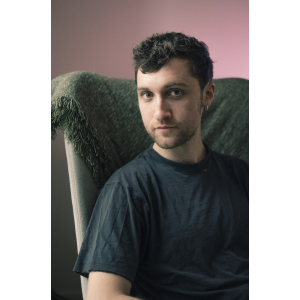Romain GNEOUCHEV
Stage Director
Romain received a creation grant for his show Une Chose Vraie.
What is your artistic background?
I come from the circus, and a traditional one at that. It always seems surprising to say that when I look at the aesthetics I identify with and the forms I produce today, but it's true. My father was a stage director, and my mother was a producer of shows that were mainly performed on red circular stages. That's probably where my love of clean, minimalist forms comes from, as well as white boxes, documentary-style theater, and social realism. It's the opposite of glittery costumes and forced smiles. I don't want to reduce the circus to that though, because it's an art form I admire and one that has helped shape the artist I am today. I’ve kept its sense of tension and the feeling of vertigo it provokes, but I reject the pain it inflicts on all the bodies that contribute to its life. More specifically, I had a relatively classical training, with two years of initial training at the Laboratoire de Formation au Théâtre Physique and three years at the Théâtre National de Strasbourg under the direction of Stanislas Nordey, who is an important figure for me. He taught me an unconditional love of working with writing and language, and the rigor with which literary material must be treated in order to uncover the secrets hidden by the author. Today, although I still have a deep love for the art of theater, and even for its traditions, I like to describe myself as more experimental and conceptual. On the borderline between documentary and fiction, life story and diversion from reality, I seek the forms I want to use and new ways of telling the stories of the present. I would like to situate myself somewhere in the following constellation:
Jérôme Bel, for the transparency with which he unfolds the dramaturgy of his shows.
Lorraine de Sagazan, for the way she uses the narrative of the theatrical experience to serve her subject.
Ken Loach, for the power he uses to articulate the intimate and the political.
Lars Von Trier, for the subtlety of his subversion and his play with boundaries.
Gérard Watkins, for his sense of rhythm and the absolute precision of his writing.
Pascal Rambert, for his boundless love of actors.
I founded my company, Fugue 31, in 2019 in Strasbourg. It is the structure through which I produce my shows. Although I am the artistic director, I am far from alone. For the past four years, I have been partnered with Léa Wermelinger. She is an unfailing support. Without her attentive ear, the work she does (production, administration, reflection) and the collaboration that unites us, I would not be where I am today. As a company, we receive valuable support from the Grand Est region, the DRAC Grand Est, and La Filature, Scène Nationale de Mulhouse.
How do you view your profession today?
I am anxious but cheerful.
Anxious, because not a week goes by without me hearing about another subsidy cut or a disastrous political decision. This anxiety goes beyond the theater. Fascism is rumbling, the political sphere is shifting ever more radically to the right, the media and social networks are increasingly in the hands of billionaires, and public services have been dismantled over the past 30 years. Culture is not alone, but it is nonetheless a major victim. The dominant discourse would have us believe that this is a minor phenomenon, that “it's not that serious,” that it's not “essential.” This is not the case. Art is the glue that holds language and beauty together. Threatening art is threatening civilization.
Cheerful, because if I didn't have joy, I wouldn't have the energy to fight or to create. The more violent the world becomes, and the more language deteriorates, the more my conviction grows that it is absolutely necessary to defend art. I am not afraid to say that art can have a concrete impact on the people it touches, that I believe in sensitivity, that I believe in love; and that these statements are increasingly political. Cheerful also because I try to have fun with it. I tell myself that, having known nothing but precariousness on a personal level, my working conditions can only improve. I started my career six months before Covid and since then we have been going through a series of crises; I've gotten used to it, that's the way it is. I don't have the time or the energy to give in to this gloomy atmosphere. More than ever, I want to fight to preserve art and the means of production we still have. Period. Of course, it's painful to see the older generation worn down and drained by the deterioration of working conditions in our professions, but we (my generation) have known nothing else, and we are determined to take up the torch and carry on.
How do you see yourself in five years? In 10 years?
Always smiling, juggling my dreams. Raising a child, activism, research, writing, rehearsals, cultural activities, and, why not, running a theater; it's a dream that's becoming more and more visible. A “role in the community”; a position that allows me to bring together art, politics, education, and collective reflection. A role in which I dream of being focused on others, sharing the ability to produce in order to defend a theater that is demanding, innovative, and in touch with the present.
Interview conducted in 2025
Photographs taken by Lys Arango in 2024


